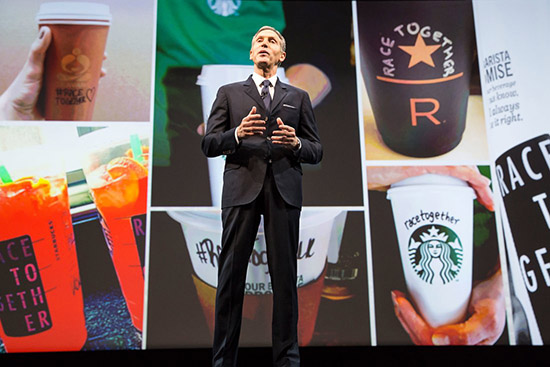要做特朗普第二,星巴克创始人放言参选美国总统
|
霍华德·舒尔茨曾担任星巴克CEO多年,在他的任期内,他成功推出了许多新产品,比如他向美国市场成功引进了南瓜拿铁,使“星冰乐”成了一个家喻户晓的名字,而且成功说服我们接受了意大利语的杯型命名。 不过这回,他开始推销自己了。日前,舒尔茨宣布将以“独立中间人士”身份参选美国总统。这个消息立时在互联网上掀起了轩然大波。 希拉里·克林顿的前新闻秘书布赖恩·法伦在推特上写道:“就连新款可口可乐都比舒尔茨的参选计划受欢迎。”《华盛顿邮报》的专栏作家亚历山德拉·佩特里也在推特上写道:“舒尔茨为什么不能像一个普通的亿万富翁一样只追求去趟太空呢?” 群众对舒尔茨参选的反应,让不少人觉得很惊讶——其中自然也包括他本人。因为舒尔茨并非没有选总统的资历。除了打造了一家非常成功的企业,舒尔茨也是最早以CEO身份成为社会活动家的人之一。他因提供了较好的工人福利被备受赞誉。另外,他很早就在控枪和同性恋婚姻问题上发声了,当时大多数企业高管甚至还没有触及这些问题。他甚至曾经带领一群CEO呼吁取缔政治献金。在特朗普下达针对穆斯林国家的移民禁令后,舒尔茨还承诺要雇佣1万名难民。 |
Former longtime Starbucks CEO Howard Schultz has nailed countless product rollouts over the years. He is, after all, the man who introduced America to pumpkin spice lattes, made the frappuccino a household name, and persuaded us to order our drink sizes in Italian even when we’re in Des Moines. But when Schultz announced that he was considering running for President as a “centrist independent”—essentially making himself the product he needed to sell—the launch blew up in a fiery ball of Internet fury. “New Coke had a better rollout than Howard Schultz 2020,” tweeted Brian Fallon, a former Hillary Clinton press secretary. “Why doesn’t Howard Schultz just try to go to space like a regular billionaire,” wrote Washington Post columnist Alexandra Petri on Twitter. Given the ex-CEO’s credentials, some—including Schultz—were surprised by the extent of the outcry. In addition to building a legitimately successful business, Schultz was one of the early leaders of the CEO activist movement. He was lauded for offering progressive worker benefits. He took on gun control and gay marriage before either was a topic most executives would even touch. He once led a group of CEOs in vowing to end political contributions until Washington got its act together. And in the wake of Trump’s travel ban from Muslim-majority countries, he pledged to hire 10,000 refugees. |

|
不过,一名CEO作为活动家参与社会问题,与一名CEO去竞选总统,还是有很大的不同的。而舒尔茨似乎混淆了两者的区别。 对舒尔茨参选反应最激烈的是左派阵营,他们担心舒尔茨会成为2020年大选的搅局者。直到不久之前,舒尔茨一直都属于民主党阵营——不过他的选举班子拒绝评论。但他现在明确表示,由于在一些政见上左翼阵营存在分歧(比如对参议员伊利莎白·沃伦提出的“财富税”,舒尔茨就斥之为“荒谬”),他已经脱离了民主党。 在担任星巴克CEO期间,舒尔茨在很多问题上采取了大胆的立场,也因此赢得了口碑。但作为一名参选人,舒尔茨对很多具体问题并无可行的政见,只顾着否决别人的提议。比如舒尔茨对CNN的波比·哈洛称,自己对医疗问题有很深的了解,这个问题“始终在我内心深处”。但当被问到他有什么计划时,他却表示:“我现在还没有计划,我还没有参加总统竞选。”选民们都喜欢老布什总统的一句名言:“这个叫愿景的东西”。舒尔茨在当CEO的时候,是有作为一位CEO的愿景的,但他显然缺乏作为一名总统候选人的愿景。弗吉尼亚大学政治中心主任拉里·萨巴托表示:“他的参选并不令人期待,因为他现在还拿不出什么东西。” 归根结底,对于舒尔茨这样的人,当下竞选总统完全是个错误的时机。《赢家通吃:改变世界的精英把戏》的作者阿南德·吉里达拉达斯认为,就在舒尔茨试水政治的人同时,很多人“却在质疑亿万富翁到底应不应该存在”。舒尔茨认为这种想法“很不美国”,然而这种激进仇富心理现在却获得了越来越多的支持。至于右翼阵营,特朗普也表示他将对美国企业界越来越苛刻。杜克大学教授亚伦·查特吉表示,随着两党都在远离中间立场,此次大选或将成为很久以来第一次美国两党都不愿成为企业界利益代言人的大选。 华盛顿的政治圈,从来都是和尚打伞,无法无天。从以往经验看,大家之所以喜欢CEO出身的总统候选人,就是希望他能把商界的效率和纪律那一套挪到政界去。吉里达拉达斯认为,这是大家在拿商业的例子往政府身上“套”——我既然可以把平衡公司的盈亏,同理也就能平衡国家的财政预算。然而这一届政府却彻底戳破了这个泡泡。左翼智库新美国(New America)的高级研究员李·德鲁特曼表示:“如果不是特朗普当选了总统,我们现在可能还会相信这个神话。”然而事实上,公立部门和私营部门是有巨大的不同的。 民调机构Change Research的创始人及CEO迈克·格林菲尔德表示:“很多人对舒尔茨在星巴克的成就表示赞赏,但这不等于人们认为自己需要一个像他那样的总统。” 舒尔茨以前就曾被人指责过“管得太宽”。2015年,他发起了一项“种族和谐”运动,他让星巴克门店的咖啡师在客人的咖啡杯上写上“种族和谐”的字样,以鼓励大家在咖啡店里谈论这个问题。由于他的想法太脱离实际,这个运动最终无疾而终。(舒尔茨表示:“我们的执行是有缺陷的。”)喜剧演员约翰·奥利弗表示:舒尔茨之所以搞出这么个夭蛾子,大约是因为过去25年间从没有人对他说过“不要”。消费者似乎觉得,你一个卖咖啡的,有什么资格以这么一种肤浅的方式,挑起这样一个复杂的、令人担忧的话题。这是舒尔茨之前没有学到的一课——有些事情是老百姓不希望企业家涉足的。(财富中文网) 本文的另一版本刊载于2019年3月刊的《财富》杂志,题目是《舒尔茨的狂妄》。 译者:朴成奎 |
But there’s a big difference between the desire for a CEO to take a run at a political issue and the desire for a CEO to run for political office. Schultz, it seems, conflated the two. Much of the wrath has come from the left, which fears Schultz will play the spoiler in the 2020 election. Until recently, Schultz, whose camp declined to comment, had been a lifelong Democrat. But he’s now made clear that he’s moved away from the party over differences with some of the policies being floated by a flank of the left—including Sen. Elizabeth Warren’s proposed wealth tax, which Schultz called “ridiculous.” Schultz took big, bold stands as CEO of Starbucks and was rewarded for it. But as a would-be candidate, he’s been light on specifics, focusing instead on rejecting the proposals put forth by others. Schultz told CNN’s Poppy Harlow that he knows a lot about health care, an issue he describes as “deeply in my heart.” But when asked for his plan, he said, “I don’t have a plan today. I’m not yet running for President.” Voters want what George H.W. Bush memorably called “the vision thing”—something Schultz had as a CEO but so far lacks as a possible candidate. “His candidacy is not compelling,” says Larry Sabato, director of the Center for Politics at the University of Virginia. “There’s nothing there.” Ultimately, the issue may be that it’s simply the perfectly wrong moment for someone like Schultz to run for President. He’s dipping his toe into political waters at a time when some people are “literally questioning whether we should have billionaires,” says Anand Giridharadas, author of Winners Take All: The Elite Charade of Changing the World. That’s a conceit Schultz has called “un-American,” but it’s nevertheless the type of once-radical idea that’s now gaining traction in some parts of the country. Meanwhile, on the right, President Trump has shown he is more than willing to castigate corporate America. As both parties move away from the center, Duke University professor Aaron Chatterji says this could be the first election in a very long time when neither party is vying to be the party of business. Traditionally, the appeal of the CEO candidate was to inject the efficiency and discipline of the business world into the perceived unruliness of Washington. Giridharadas calls this the “metaphoring” of business and government—hey, I can balance the budget just like I balance my company’s books. The current administration has dismantled that narrative, argues Lee Drutman, a senior fellow at the left-leaning think tank New America. “If it hadn’t been for the Trump presidency, we would still be playing up that myth,” he says. In reality, the public and private sectors are vastly different. “There’s an appreciation for what Schultz built at Starbucks,” says Mike Greenfield, cofounder and CEO of polling firm Change Research, “but that doesn’t translate into people saying, I need a person like this as President.” Schultz has been accused of overreaching before. In 2015 he launched a campaign to encourage conversation about race in Starbucks stores by having baristas write Race Together on coffee cups—a disastrous move that came off as out of touch with reality. (Schultz has said, “The execution was flawed.”) Comedian John Oliver joked that the initiative showed Schultz hadn’t been told no in 25 years. Customers seemed to feel that a guy who sold coffee had no place instigating a conversation about a fraught and complex topic in such a superficial way. It was a lesson Schultz seems not to have learned: that there are some things that the public would prefer a CEO not wade into. A version of this article appears in the March 2019 issue of Fortune with the headline “The Audacity of Schultz.” |













